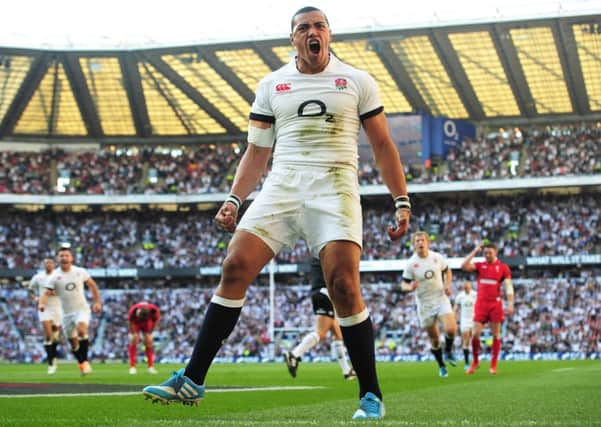England 29 - 18 Wales: England win Triple Crown


England 29 - 18 Wales
SCORERS: England: Tries: Care, Burrell. Cons: Farrell 2. Pens: Farrell 5. Wales: Pens: Halfpenny 6.
Referee: R Poite (Fra)
Venue: Twickenham
Attendance: 82,000
In emphatically avenging a record drubbing at Wales’ hands last season, England’s 29-18 victory means that if they beat Italy in Rome next Saturday and current tournament leaders Irelandlose or draw away to France, then Chris Robshaw’s men will take the title.
Advertisement
Hide AdAdvertisement
Hide AdWales’ bid for an unprecedented Six Nations title hat-trick effectively ended on a sobering afternoon for a team that was also dismantled by Ireland four weeks ago.
Scrum-half Danny Care and centre Luther Burrell scored tries during the opening 35 minutes for England, while Owen Farrell kicked 19 points, landing all seven of his shots at goal.
Only Leigh Halfpenny’s astonishing accuracy – six penalties from six attempts – kept Wales interested, but they could have no complaints as England’s dominance gained a rich and just reward on the scoreboard.
It was a landmark success in England coach Stuart Lancaster’s two-year reign, and also struck an early psychological blow ahead of the countries’ World Cup 2015 pool meeting in 18 months’ time.
Wales’ woeful kicking strategy and tendency to concede penalties at regular intervals played into English hands, yet the hosts also possessed the game’s sharpest attacking forces in Care and full-back Mike Brown.
England should arguably have won by more than they did as their impressive upward curve under Lancaster continues, but for Wales, it is back to the drawing board.
England showed one enforced change from the side that ended Ireland’s Grand Slam hopes a fortnight ago, with Gloucester No 8 Ben Morgan replacing ankle injury victim Billy Vunipola.
Wales, meanwhile, welcomed back fit-again British and Irish Lions centre Jonathan Davies for his first Test start since early November, with lock Jake Ball replacing Luke Charteris, who is nursing a neck problem suffered in training four days previously.
Advertisement
Hide AdAdvertisement
Hide AdEngland, as if spurred on by their Millennium Stadium horror show of 12 months ago, blasted from the starting blocks and were ahead after just five minutes.
It took a superb tackle by Wales skipper Sam Warburton on his opposite number Robshaw to initially thwart England following prop David Wilson’s break, but when the visitors then infringed, Care caught them napping.
Wales were asleep defensively, and no-one laid a finger on Care as he scampered over following his quick tap penalty, with Farrell’s conversion making it 7-0. It was England’s first try against Wales since August 2011.
Halfpenny cut the deficit through an eighth-minute penalty, but Wales should have wiped it out completely when wing George North broke free, but he ignored an unmarked Dan Lydiate outside him and kicked into touch instead.
It was a dreadful option by North, and England regained a seven-point advantage after Wales conceded a scrum penalty with Farrell punishing them from 40 metres out.
Although Halfpenny maintained his 100 per cent accuracy by kicking a third penalty, this time from halfway, Wales then imploded after a lineout inside their own 22.
Hooker Richard Hibbard’s off-target throw gave England an attacking opportunity, and they ruthlessly punished Wales when centre Billy Twelvetrees’ superbly-placed kick was gathered by Burrell for his third try in four Six Nations games this season.
Farrell effortlessly landed the touchline conversion, before Wales were again indebted to Halfpenny, whose fourth successful penalty made it 20-12 and at least retained a glimmer of hope for the misfiring visitors that they could turn around a game England were dominating.
Advertisement
Hide AdAdvertisement
Hide AdAnd that optimism increased on the stroke of half-time when Halfpenny landed another long-range strike after England wing Jonny May was harshly penalised for a challenge on Jamie Roberts in the air.
Given how much England had controlled the match, Wales were fortunate to troop off just five points adrift in a game that had shades of their 1999 victory over England at Wembley. On that occasion Wales were outplayed for 40 minutes, but Neil Jenkins’ boot kept them in it and they went on to win.
Wales needed a strong third quarter, yet it went England’s way as two further Farrell penalties opened up an 11-point advantage and the visitors saw prop Gethin Jenkins sin-binned for a second successive match.
Referee Romain Poite’s patience with the scrum finally snapped, and prop Gethin Jenkins, who was equalling Stephen Jones’ Wales cap record of 104, received a yellow card at a critical time in the contest.
Another Halfpenny penalty – his sixth – clawed Wales back to 26-18 behind, before Farrell closed the game out with his fifth successful strike, and Burrell was narrowly denied his second try after his foot brushed the touchline following a scintillating England move.
England: Brown; Nowell, Burrell, Twelvetrees, May; Farrell, Care; Marler, Hartley, Wilson, Launchbury, Lawes, Wood, Robshaw, Morgan. Subs: Goode for Brown (79), Ford for Farrell (79), Dickson for Care (79), M. Vunipola for Marler (64), Attwood for Wilson (73), Johnson for Wood (79). Not Used: T. Youngs, Thomas.
Wales: Halfpenny; Cuthbert, Davies, Roberts, North; Priestland, Webb; Jenkins, Hibbard, A. Jones, Lee, A. Jones, Lydiate, Warburton, Faletau. Subs: L. Williams for Halfpenny (76), Biggar for Priestland (62), James for Jenkins (64), Owens for Hibbard (55), R. Jones for A. Jones (67), Tipuric for Lydiate (76). Not Used: Coombs, M. Phillips.